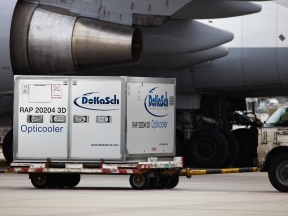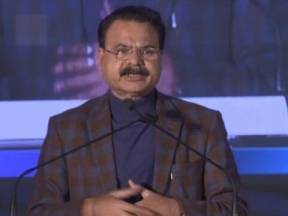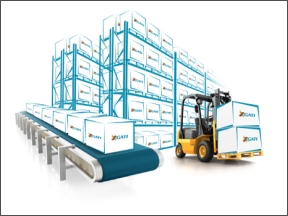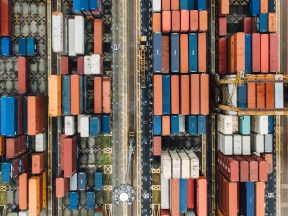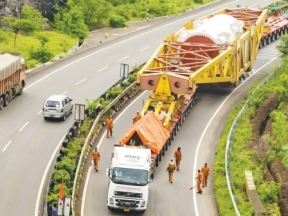Delta Cargo has approved the use of the DoKaSchOpticooler RAP container as part of its cold chain pharma service. The approval comes as the air cargo industry prepares for the widespread transportation and distribution of Covid-19 vaccines. Key features of the DoKaSchOpticooler RAP container include: temperature ranges of 2-8°C and 15-25°C, which enable it to be used for the transportation of Pharma 1 goods without dry ice; a large loading compartment that accommodates five standard Euro pallets or four CP-1 pallets; a battery that requires two to four hours of charging time, operational times of up to 120 hours; and a large control panel plus quadruple redundancy for all critical parts, which help to ensure “backups for each feature in case of failure”. Shawn Cole, Delta’s vice president of cargo, commented, “The introduction of the Opticooler provides our customers with more choice when looking for reliable container options to support the growing global demand for pharma and vaccine shipments.” “Alongside our joint venture partners, Air France-KLM Cargo, we can now offer our customers a seamless experience across the trans-Atlantic, helping to keep supply chains moving and ensuring the safe delivery of temperature sensitive shipments during the current pandemic.” Andreas Seitz, managing director at DoKaSch Temperature Solutions, added: “This agreement with Delta provides more transport options for shippers of sensitive pharmaceutical goods, which is especially important for the upcoming transport of vaccines against Covid-19. Many of these will require a temperature range between 2°C and 8°C during transport, which is exactly what our Opticooler is made for. Delta further expands our extensive global network which allows us to offer our temperature-controlled packaging solutions at even more locations.”
Read More »Assam to develop Jogigopha as a logistics hub for cargo moving from Arunachal Pradesh to Bangladesh
Assam is all set to have country’s first international multi-modal hub, informs Chandra Mohan Patowary, Assam Industry and Commerce Minister. The Asian Development Bank (ADB) has agreed to fund the project at an estimated cost of around Rs 600 crore. “The Government of Assam is planning to develop Jogighopa, a small township near Brahmaputra river, as a logistics hub or trans-shipment point for cargo moving from Assam, Arunachal Pradesh, Nagaland to Bangladesh,” the minister informs. In addition, the Munshiganj River Terminal in Bangladesh will be used as a customs station to handle third-party export and import cargo via Kolkata Port. “To bring about a significant reduction in logistics cost and faster delivery of Bangladesh export cargo, the Indian side has raised the point regarding permitting a third country export-import trade under the coastal shipping agreement and protocol on inland water transit and trade (PIWTT) by allowing trans-shipment through ports on the east coast of India. The Bangladesh government agreed to hold stakeholder consultations and revert on the matter,” Patowary said. “Increasing connectivity through air, water, rail, road offer a mutually beneficial opportunity for enhancing economic cooperation between Bangladesh and the Northeastern states of India and beyond. Standard operating procedures for the use of Chattagram and Mongla ports for movement of goods to and from India, particularly to and from the Northeast of India have recently been concluded and it is expected that it would create a win-win situation for both economies,” he adds.
Read More »COVID-19 shrinks food supply chain: Manoj Pant
Highlighting the need for a robust cold chain infrastructure to strengthen the supply and storage of perishables to suffice India’s population, Manoj Pant, Regional Business Manager West, Snowman Logistics, notes “India is home to 535 agri-tech startups that use technology to bolster agricultural productivity. Food security in India has been immensely impacted by the pandemic in four main aspects – availability, accessibility, stability, and utilisation of food. Disruption in supply chains and a decline in demand have caused a loss of production and income to the farmers and traders. Closure of mandis and QSRs due to the lockdown led to a surplus accumulation of perishables. Since post-harvest losses are highest in the fruit and vegetable sector, agri-tech startups can bridge the gap with demand-driven cold chains, warehouse monitoring solutions, and market linkages that can significantly boost farmer income. With innovations in technology like storage monitoring based on the Internet of Things (IoT), image sensing for quality grading and digitisation of mandis will prevent the wastage of perishables.
Read More »Gati-KWE develop their express logistics capacity by two-fold; expect 50% growth in volume
In order to cater to the upcoming festive season demand, Gati-KWE has revamped its express distribution, warehousing, and supply chain management services. Despite the COVID-19 pandemic, the company expects robust 50 per cent growth in volumes during the October-December festive season. The company is actively building capacity, strengthening its supply chain and delivery capabilities to cater to the expected volume rush. “We are further augmenting our express logistics capacity by two-fold for the upcoming festive season. Our decision to expand resources and service bandwidth by hiring additional trucks is a consequence of our experience and understanding of the market underlined by our commitment to efficiently accommodate the increased and dynamic demands of our customers during this period. As we go about doubling our capabilities, we are also giving utmost attention to COVID-19 care and safety and ensuring 100% adherence to precautions for our staff members, operators, partners, and all other stakeholders working with us,” said Bala Aghoramurthy, Deputy Managing Director, Gati-KWE Ltd. The company is aggressively promoting various offers to drive sales. These intense efforts are expected to significantly drive logistics volumes and demand in the festive season. Additionally, the changes in buying patterns suggest that consumer sentiment in India is gradually improving. According to the recent Mintel research findings, almost 30% of Indian consumers surveyed, plan to spend more on clothes and accessories followed by other goods.
Read More »FourPL partners with FarEye bringing predictive visibility to customers
FourPL, an Australian IT consulting company specialising in supply chain and procurement, has announced a partnership with FarEye to bring predictive capability to help brands orchestrate, track, optimize and deliver goods faster. “Our customers are demanding real-time visibility in their logistics operations and expect to know exactly when, where and how their goods will be delivered.” says Brett Findlay, CEO, FourPL. FarEye helps businesses to orchestrate logistics processes in a multi-enterprise & multi-stakeholder environment to ensure seamless & efficient movement of goods. The leading machine-learning based platform is empowering global enterprises to shrink delivery time by up to 27%, increase courier productivity by up to 15%, eliminate risks by up to 57%, and achieve operational excellence. “Today’s increasingly customer-centric economy requires integrated and value-added capabilities to achieve competitive advantage. FarEye helps organisations to maximise productivity and minimise risk while continuously making logistics operations efficient. We are passionate about making movement of goods a positive experience through innovation, deployment of industry best processes and constant improvement. We make organizations future-ready by differentiating their offerings & making them best in class. This enables them to drive expected behaviour and underpin broader business objectives,” says, Kushal Nahata, CEO & Co-founder, FarEye.
Read More »TIR to improve trade between India, Central Asia & CIS countries: Customs Commissioner, Nhava Sheva
In a webinar on ATA & UN TIR Carnet with a focus on ‘facilitates free movement of goods across multiple international borders’, Sunil K Mall, Commissioner of Customs, Nhava Sheva, Mumbai, said, “TIR will facilitate intermodal transport and act as enabling document to cross multiple international borders without any additional checks. It will further help to improve trade between India, Central Asia & CIS countries.” While sharing his experience as the first TIR holder in India Shankar Shinde, Chairman-Elect, FFFAI, said, “Customs procedures in India should be further simplified under TIR to benefit large traders and exporters in India.” Raphael Hirt, IRU, Geneva, said, “The International Road Transport Union was very pleased to acknowledge the interest shown by Indian exporting industry towards the TIR procedure, especially the efforts made by CBIC, FICCI and FFFAI to promote this trade facilitation tool. IRU will continue to support all stakeholders involved in the implementation of TIR and its electronic version – eTIR in India. This will enable trade actors and Customs to benefit fully from the immense advantages provided by the TIR Convention which includes simplification of border crossing procedures, reduction of time and cost for the international movements of goods.” ATA Carnet is a temporary admission document, which simplifies the customs procedures and clearances in a foreign country, without paying duty or a bank guarantee for temporary import into that country. Like a passport for goods, ATA Carnet allows for the goods for which it was issued to enter any of the participating countries for up to one year. An ATA Carnet holder can avoid customs declaration and can do away with security deposit or guarantee in the country of temporary importation. …
Read More »Locus join hands with Vinculum to facilitate omnichannel commerce & supply chain fulfillment to customers
Locus has announced a partnership with Vinculum to offer brands & retailers best-in-class routing, omnichannel commerce solutions, and supply chain management under one roof. Locus and Vinculum will together provide a seamless solution for brands to manage everything E-commerce, right from global marketplace listings, data consistency, real-time view of inventory in stores, BOPIS (buy online, pick up in-store), BOPAK (buy online, pick up at kerbside), Returns across channels, to last-mile routing. “Locus is continuously increasing its presence in Southeast Asia, Middle East, and India. In these markets, the relevance of E-commerce and Direct-to-Consumer (D2C) has skyrocketed in the recent past. Companies are looking for solutions to go online and reach more customers,” said Krishna Khandelwal, Chief Business Officer, Locus. “We work with all parts of the Omnichannel ecosystem including brands, 3pls, marketplaces and retailers. Smart logistics solutions are a problem area for many of our customers. The partnership with Locus will help our customers to be more efficient and enable them to scale faster,” says Venkat Nott, Founder & CEO, Vinculum Group. Locus uses deep machine learning and proprietary algorithms to offer smart logistics solutions to customers. The company presently works with top clients across Southeast Asia, North America, Europe, and India. It has offices in the USA, India, Indonesia, and Vietnam. The top management of the company includes executives from Amazon Web Services (AWS), Barclays Capital, Google, and BlueDart (a DHL company), and data scientists with PhDs from the Carnegie Mellon University and the University of Illinois, among others. Locus has so far raised $29 million from tier-1 investors like Tiger Global, Falcon Edge, Blume Ventures, Exfinity Venture Partners, & growX ventures, among others.
Read More »Allcargo Logistics augments growth in Africa with collaborations & embarking complex projects
To accelerate growth across Africa’s vast logistics ecosystem, Allcargo is leveraging its global expertise to undertake trans-country movement of big project cargoes in the world’s second-largest continent. Building close collaborations with partners, customers and stakeholders within Africa, the company has exuded a spirit of innovation while tackling complex projects like ODC transportation, water pipelines and power transmission lines. “Allcargo’s global aspirations are driven by its aim to create opportunities, drive partner progress, and lend its expertise to projects across geographies that transform economies and boost growth. It is this futuristic approach that has led the company to create a niche in Africa. Committing to the highest standards of safety and zero compromise on compliance, Allcargo is set to prove its mettle as a trusted logistics partner in helping Africa scale new heights of growth,” said Rahul Rai, Business Head – Projects & Engineering Division, Allcargo Logistics, on the sidelines of the 15th CII – Exim Bank Digital Conclave on India – Africa Project Partnership. With a network of 300 offices across 160 countries and a wholly-owned global subsidiary ECU Worldwide, Allcargo has a presence in most African trade hubs. The company worked on key infrastructure projects across six African countries during the Covid-induced lockdown. In Tanzania, Allcargo handled follow-ups with Government Procurement Services Agency (GPSA) for payment of shipping line charges, exemption regularisation, TAN road permits for oversized project cargo, customs clearance, loading permits, pickup and delivery of shipments for the regional Rusumo Falls hydropower project. In Burundi, Allcargo took care of follow-ups with OBR (Burundais des recettes) for exemption regularisation, clearance through single customs territory and payment of shipping line charges. The company also arranged border clearance and empty …
Read More »Shipsy launches ‘network module’ for Indian MSMEs/SMEs; on-boarded over 5000 exporters
Shipsy has announced to extend its platform for free of cost to the SMEs/MSMEs in India under its ‘Network Module’. The platform will provide SMEs/MSMEs access to utilities to connect with the verified agents and get access to competitive rates as well as much better service levels due to these vendors being verified by Shipsy. The platform offers a bouquet of services like price procurement, documentations handling and container tracking to improve on-time delivery of goods. Soham Chokshi, Co-Founder & CEO at Shipsy, said, “The MSME/SME segment has perhaps been the hardest hit segment in COVID-19, and the segment is in a desperate need to expand their business by going international. With a vision and aim to scale up Indian MSMEs/SMEs and give a boost to Atmanirbhar Bharat, we have launched ‘Network Module’ for MSMEs/SMEs to help the sector navigate through the challenges of exporting goods and most importantly help them become cost competitive in the global arena by reducing their freight costs. We have on-boarded more than 5000 small enterprises for this. We aim to expand the offering to Pan India and plan to cover more than 20,000 enterprises by the end of this fiscal. Our offering is aligned with ‘Atmanirbhar Bharat’ and ‘Make in India’ initiatives and it will enable the sector for long term sustainability, profitability and will address the needs of the SMEs/MSMEs. There are around 36 million SMEs operating in the country, generating 80 million employment opportunities and contributing 8 per cent to India’s GDP. We are currently processing 1.5 million transactions through our platform on daily basis and processes over 10 per cent of India’s total containerised export and import volume.” Last year Shipsy …
Read More »COVID-19 accelerates industry digitalisation to years: DHL Logistics Trend Radar Report
In the fifth edition of the Logistics Trend Radar, DHL has revealed 29 key trends that will impact the logistics industry over the next years. The fifth-edition of Logistics Trend Radar indicates that we are experiencing an overall stabilisation of trends from the past four years. However, with the logistics industry weathering the current global pandemic, transformation processes have been accelerated. COVID-19 has driven changes regarding recent logistics innovation, automation, and digital work more rapidly and has accelerated industry digitalisation by years. Conversely, many trends initially perceived as disruptive game-changers for the logistics industry have yet to deliver on their disruptive potential. Self-driving vehicles and drones continue to be held back by legislative and technical challenges as well as limited social acceptance. Logistics marketplaces are stabilising on a few leading platforms and established forwarders are entering the game with their own digital offerings, backed with robust global logistics networks. From cloud computing to collaborative robotics, big data analytics, artificial intelligence, and the Internet of Things, logistics professionals have to make sense of a vast market of novel technology. Modernising all touch points of supply chains, from an elegant digital or customer journey, through fulfillment transport and final mile delivery is the new imperative for long-term success. Those who adopt and scale new technology and up-skill workforces fastest will have a competitive advantage on the market.
Read More » Cargo Breaking News
Cargo Breaking News
